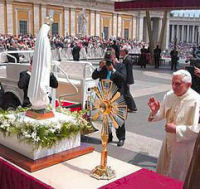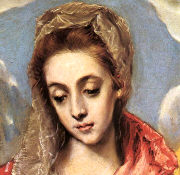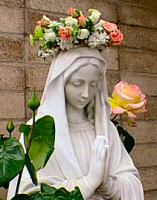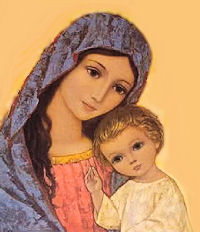01st May A.D. 2014
- MAY -
MONTH OF MARY
The month of May is the "month which the piety of the faithful has especially dedicated to Our Blessed Lady," and it is the occasion for a "moving tribute of faith and love which Catholics in every part of the world [pay] to the Queen of Heaven. During this month Christians, both in church and in the privacy of the home, offer up to Mary from their hearts an especially fervent and loving homage of prayer and veneration. In this month, too, the benefits of God's mercy come down to us from her throne in greater abundance" (Paul VI: Encyclical on the Month of May, no. 1).
This Christian custom of dedicating the month of May to the Blessed Virgin arose at the end of the 13th century. In this way, the Church was able to Christianize the secular feasts which were wont to take place at that time. In the 16th century, books appeared and fostered this devotion.
The practice became especially popular among the members of the Jesuit Order — by 1700 it took hold among their students at the Roman College and a bit later it was publicly practiced in the Gesu Church in Rome. From there it spread to the whole Church.
The practice was granted a partial indulgence by Pius VII in 1815 and a plenary indulgence by Pius IX in 1859. With the complete revision of indulgences in 1966 and the decreased emphasis on specific indulgences, it no longer carries an indulgence; however it certainly falls within the category of the First General Grant of Indulgences. (A partial indulgence is granted to the faithful who, in the performance of their duties and in bearing the trials of life, raise their mind with humble confidence to God, adding — even if only mentally — some pious invocation.
Excerpted from Enchiridion of Indulgences.
The Month of Mary and the Popes
The pious practice of honoring Mary during the month of May has been especially recommended by the Popes. Pius XII made frequent reference to it and in his great Encyclical on the Sacred Liturgy (Mediator Dei) characterized it as one of "other exercises of piety which although not strictly belonging to the Sacred Liturgy, are nevertheless of special import and dignity, and may be considered in a certain way to be an addition to the liturgical cult: they have been approved and praised over and over again by the Apostolic See and by the Bishops" (no. 182).
Paul VI wrote a short encyclical in 1965 using the Month of Mary devotion as a means of obtaining prayers for peace. He urged the faithful to make use of this practice which is "gladdening and consoling" and by which the Blessed Virgin Mary is honored and the Christian people are enriched with spiritual gifts" (no. 2).
In May of 2002 Pope John Paul II said, "Today we begin the month dedicated to Our Lady a favourite of popular devotion. In accord with a long-standing tradition of devotion, parishes and families continue to make the month of May a 'Marian' month, celebrating it with many devout liturgical, catechetical and pastoral initiatives!"
Devotion to Mary
The Blessed Virgin Mary is the Mother of the Church and therefore the example, as well as the guide and inspiration, of everyone who, in and through the Church, seeks to be the servant of God and man and the obedient agent of the promptings of the Holy Spirit.
The Holy Spirit, as Pope Leo XIII reminded us, is the soul of the Church: All the activity and service of the members of the Church, beginning with the supreme participation of the Blessed Mother in the work of the Church, is vivified by the Holy Spirit as the body, in all its activities, is vivified by its soul. The Holy Spirit is the Paraclete, Advocate, and Comforter which Christ Himself sent to be our consolation in the sorrowful mysteries of life, our source of moderation in the joyful mysteries of life, our added principle of exaltation in the glorious mysteries of life.
So He was for the Blessed Mother; so also He is for the least of us; so also He is for the rest of the Church, even for those who are its unconscious but conscientious members.
Wherever there is faith there is the example of Mary, because she lived by faith as the Scriptures remind us....
If, then, piety is the virtue which binds us to the sources of all life, to God, to our parents, to the Church, to Christ, certainly Christian piety binds us, in grateful love, to Mary — or our acceptance of Christ and of the mystery of our kinship with Him is imperfect, partial, and unfulfilled. — Cardinal John Wright
Mary and Our Spiritual Life
In our observance of the Marian month we should take into account the season of the Liturgical Year which largely corresponds with the fifty days of Easter. Our pious exercises could emphasize Our Lady's participation in the Paschal mystery and in Pentecost with which the Church begins. The pious exercises connected with the month of May can easily highlight the earthly role played by the glorified Queen of Heaven, here and now, in the celebration of the Sacraments of Baptism, Confirmation and Holy Eucharist.
The following practices which are recommended by the Magisterium are offered as suggestions for honoring Our Lady during Her month:
The Regina Coeli
The ecclesial community addresses this antiphon to Mary for the Resurrection of her Son. It adverts to, and depends on, the invitation to joy addressed by Gabriel to the Lord's humble servant who was called to become the Mother of the saving Messiah.
The Rosary
Also called the Psalter of the Blessed Virgin Mary, the Rosary is one of the most excellent prayers to the Mother of God. Thus, "the Roman Pontiffs have repeatedly exhorted the faithful to the frequent recitation of this biblically inspired prayer which is centered on contemplation of the salvific events of Christ's life, and their close association with the Virgin Mother."
Litanies of the Blessed Virgin Mary
These consist of a long series of invocations to Our Lady, which follow in a uniform rhythm, thereby creating a stream of prayer characterized by insistent praise and supplication.
Consecration and Entrustment to Mary
The Roman Pontiffs have frequently expressed appreciation for the pious practice of "consecration to the Blessed Virgin Mary" and the formulas publicly used by them are well known.
Louis Grignon de Montfort is one of the great masters of the spirituality underlying the act of "consecration to Mary". He "proposed to the faithful consecration to Jesus through Mary, as an effective way of living out their baptismal commitment."
The Brown Scapular and other Scapulars
The scapular is an external sign of the filial relationship established between the Blessed Virgin Mary, Mother and Queen of Mount Carmel, and the faithful who entrust themselves totally to her protection, who have recourse to her maternal intercession, who are mindful of the primacy of the spiritual life and the need for prayer.
Medals
These are witnesses of faith and a sign of veneration of the Holy Mother of God, as well as of trust in her maternal protection.
The Church blesses such objects of Marian devotion in the belief that "they help to remind the faithful of the love of God, and to increase trust in the Blessed Virgin Mary."
The "Akathistos" Hymn
In the Byzantine tradition, one of the oldest and most revered expressions of Marian devotion is the hymn of the "Akathistos" — meaning the hymn sung while standing. It is a literary and theological masterpiece, encapsulating in the form of a prayer, the universally held Marian belief of the primitive Church.
Excepted from the Directory on Popular Piety and the Liturgy
The Litany of Loretto
The Litany of the Blessed Virgin–also called the Litany of Loreto–is one of the many Marian litanies, or praises of Mary, composed during the Middle Ages. The place of honor it now holds, in the life of the Church, is due its faithful use at the shrine of the Holy House at Loreto, which, according to tradition, was the small cottage-like home where the Holy Family had lived and which was miraculously transported by angels, in 1291, from the Holy Land to its present location in Loreto. It was definitely recommended by Pope Clement VII and approved by Sixtus V in 1587, and all other Marian litanies were suppressed, at least for public use.
Its forty-nine titles (fifty, or fifty-one, or even more, in some versions: with "Mother of the Church" and "Mother of Mercy" and being the 'official' 'newcomers' in recent times and which are included on the Vatican website version) and invocations set before us Mary's exalted privileges, her holiness of life, her amiability and power, her motherly spirit and queenly majesty. Reflection on the titles of the litany, therefore, will unfold before us a magnificent picture of our heavenly Mother, even though we know little about her life.
In form, the Litany of Loreto is composed on a fixed plan common to several Marian litanies already in existence during the second half of the fifteenth century, which in turn are connected with a notable series of Marian litanies that began to appear in the twelfth century and became numerous in the thirteenth and fourteenth. The Loreto text had, however, the good fortune to be adopted in the famous shrine, and in this way to become known, more than any other, to the many pilgrims who flocked there during the sixteenth century. The text was brought home to the various countries of Christendom, and finally it received for all time the supreme ecclesiastical sanction.
Sixtus V, who had entertained a singular devotion for Loreto, by the Bull "Reddituri" of 11 July, 1587, gave formal approval to it, as to the litany of the Holy Name of Jesus, and recommended preachers everywhere to propagate its use among the faithful.
Excerpted from The History of the Litany of Our Lady.
Description:
This beautiful litany can be recited alone, or after praying the rosary, particularly during the month of May, dedicated to Mary. A partial indulgence is attached to those who pray this litany.
Prayer:
Lord, have mercy.
Christ, have mercy.
Lord, have mercy.
Christ, hear us.
Christ, graciously hear us.
God, the Father of Heaven, have mercy on us.
God the Son, Redeemer of the world, have mercy on us.
God the Holy Spirit, have mercy on us.
Holy Trinity, One God, have mercy on us.
Holy Mary, pray for us.
Holy Mother of God, pray for us.
Holy Virgin of virgins, pray for us.
Mother of Christ, pray for us.
Mother of divine grace, pray for us.
Mother most pure, pray for us.
Mother most chaste, pray for us.
Mother inviolate, pray for us.
Mother undefiled, pray for us.
Mother most amiable, pray for us.
Mother most admirable, pray for us.
Mother of good counsel, pray for us.
Mother of our Creator, pray for us.
Mother of our Savior, pray for us.
Virgin most prudent, pray for us.
Virgin most venerable, pray for us.
Virgin most renowned, pray for us.
Virgin most powerful, pray for us.
Virgin most merciful, pray for us.
Virgin most faithful, pray for us.
Mirror of justice, pray for us.
Seat of wisdom, pray for us.
Cause of our joy, pray for us.
Spiritual vessel, pray for us.
Vessel of honor, pray for us.
Singular vessel of devotion, pray for us.
Mystical rose, pray for us.
Tower of David, pray for us.
Tower of ivory, pray for us.
House of gold, pray for us.
Ark of the covenant, pray for us.
Gate of heaven, pray for us.
Morning star, pray for us.
Health of the sick, pray for us.
Refuge of sinners, pray for us.
Comforter of the afflicted, pray for us.
Help of Christians, pray for us.
Queen of Angels, pray for us.
Queen of Patriarchs, pray for us.
Queen of Prophets, pray for us.
Queen of Apostles, pray for us.
Queen of Martyrs, pray for us.
Queen of Confessors, pray for us.
Queen of Virgins, pray for us.
Queen of all Saints, pray for us.
Queen conceived without original sin, pray for us.
Queen assumed into heaven, pray for us.
Queen of the most holy Rosary, pray for us.
Queen of Peace, pray for us.
Lamb of God, who take away the sins of the world, spare us, O Lord!.
Lamb of God, who take away the sins of the world, graciously hear us, O Lord!
Lamb of God, who take away the sins of the world, have mercy on us.
V. Pray for us, O holy Mother of God.
R. That we may be made worthy of the promises of Christ.
Let us pray. Grant, we beg you, O Lord God, that we your servants, may enjoy lasting health of mind and body, and by the glorious intercession of the Blessed Mary, ever Virgin, be delivered from present sorrow and enter into the joy of eternal happiness. Through Christ our Lord.
R. Amen.
During Advent
Let us pray. O God, you willed that, at the message of an angel, your Word should take flesh in the womb of the Blessed Virgin Mary; grant to your suppliant people, that we, who believe her to be truly the Mother of God, may be helped by her intercession with you. Through the same Christ our Lord.
R. Amen.
From Christmas to the Purification
Let us pray. O God, by the fruitful virginity of Blessed Mary, you bestowed upon the human race the rewards of eternal salvation; grant, we beg you, that we may feel the power of her intercession, through whom we have been made worthy to receive the Author of life, our Lord Jesus Christ your Son. Who lives and reigns with you forever and ever.
R. Amen.
During Paschaltime
Let us pray. O God, who by the Resurrection of your Son, our Lord Jesus Christ, granted joy to the whole world; grant, we beg you, that through the intercession of the Virgin Mary, his Mother, we may attain the joys of eternal life. Through the same Christ our Lord.
R. Amen.
Prayer Source: Enchiridion of Indulgences , June 29, 1968
Source: www.catholicculture.org




































